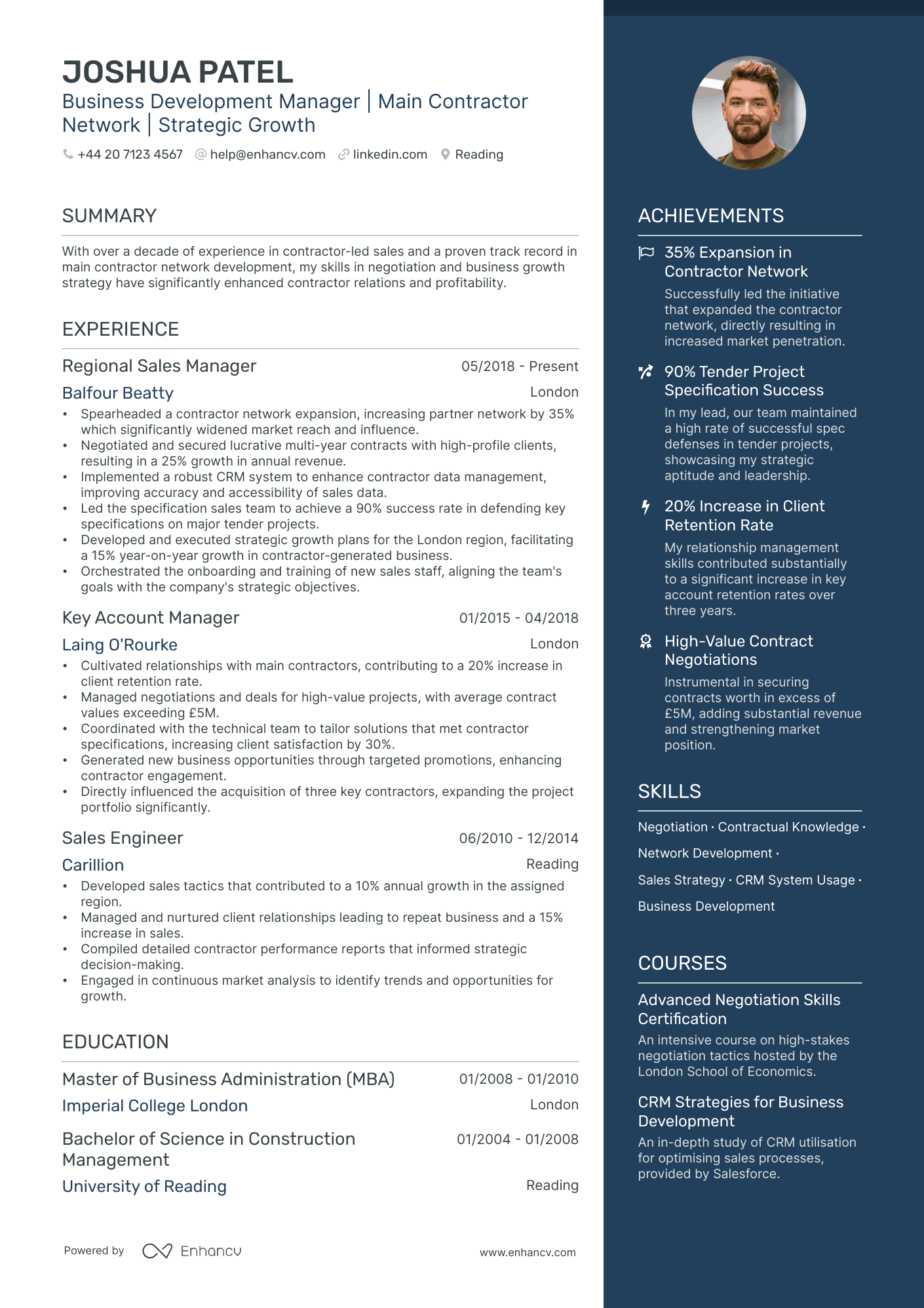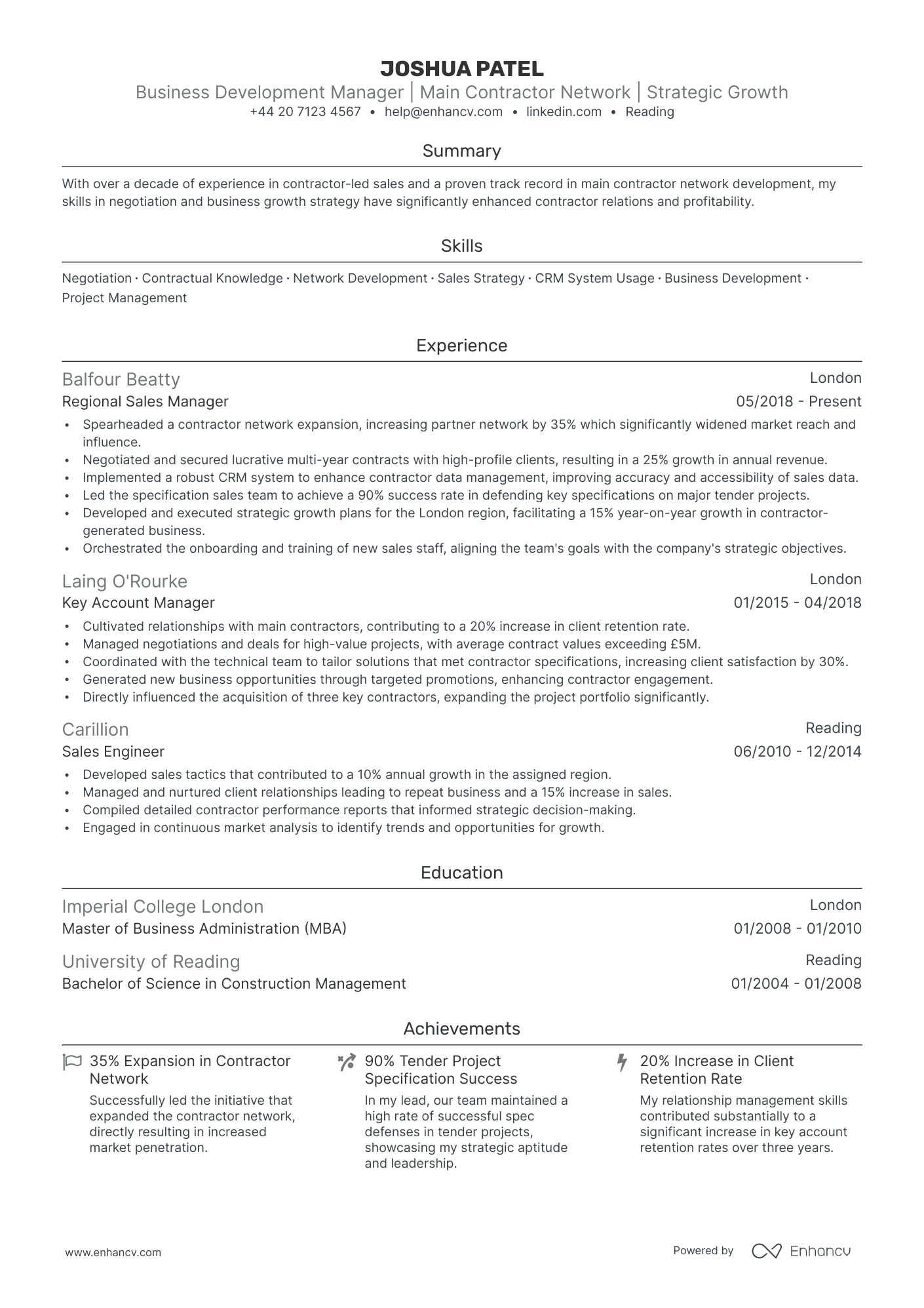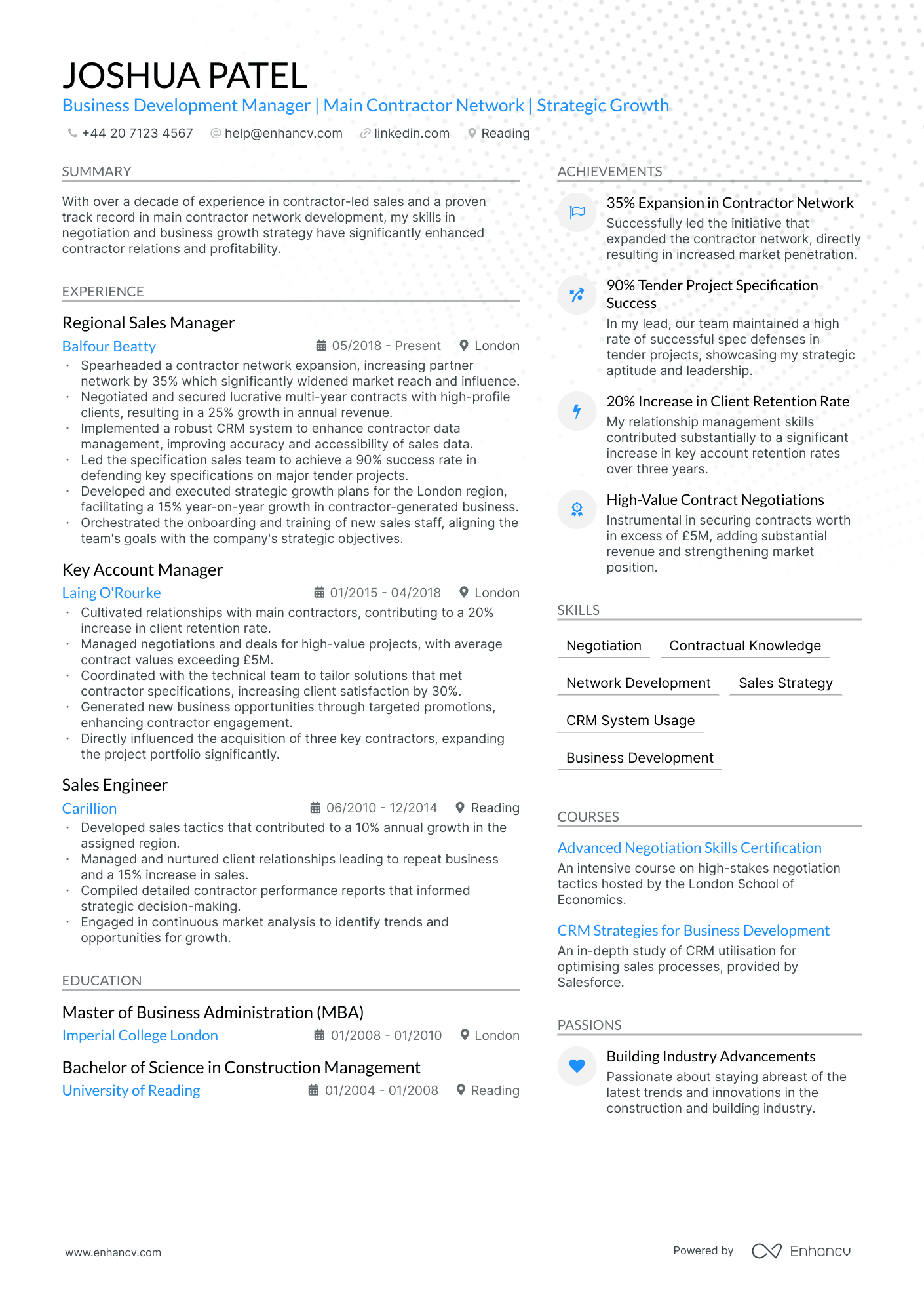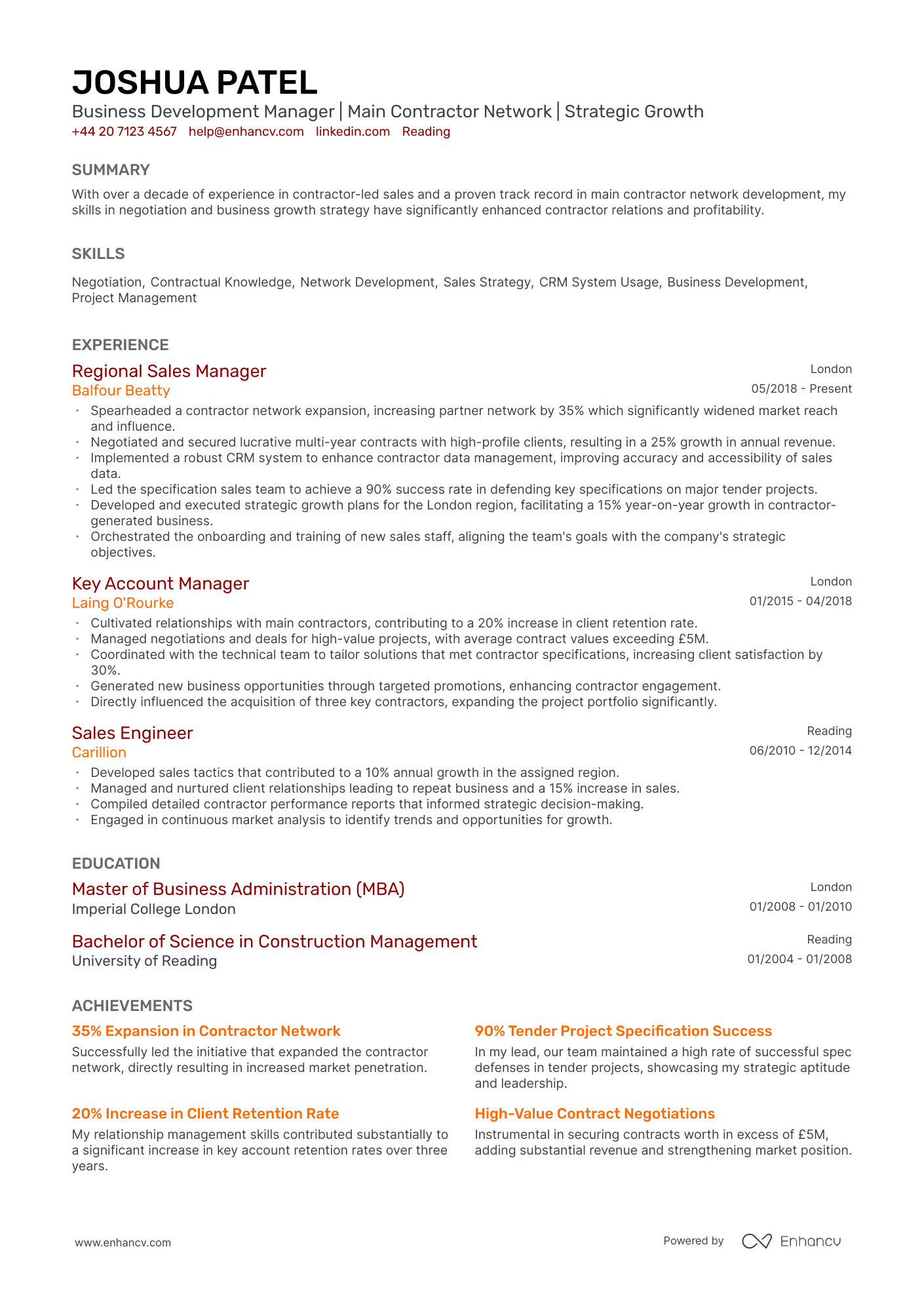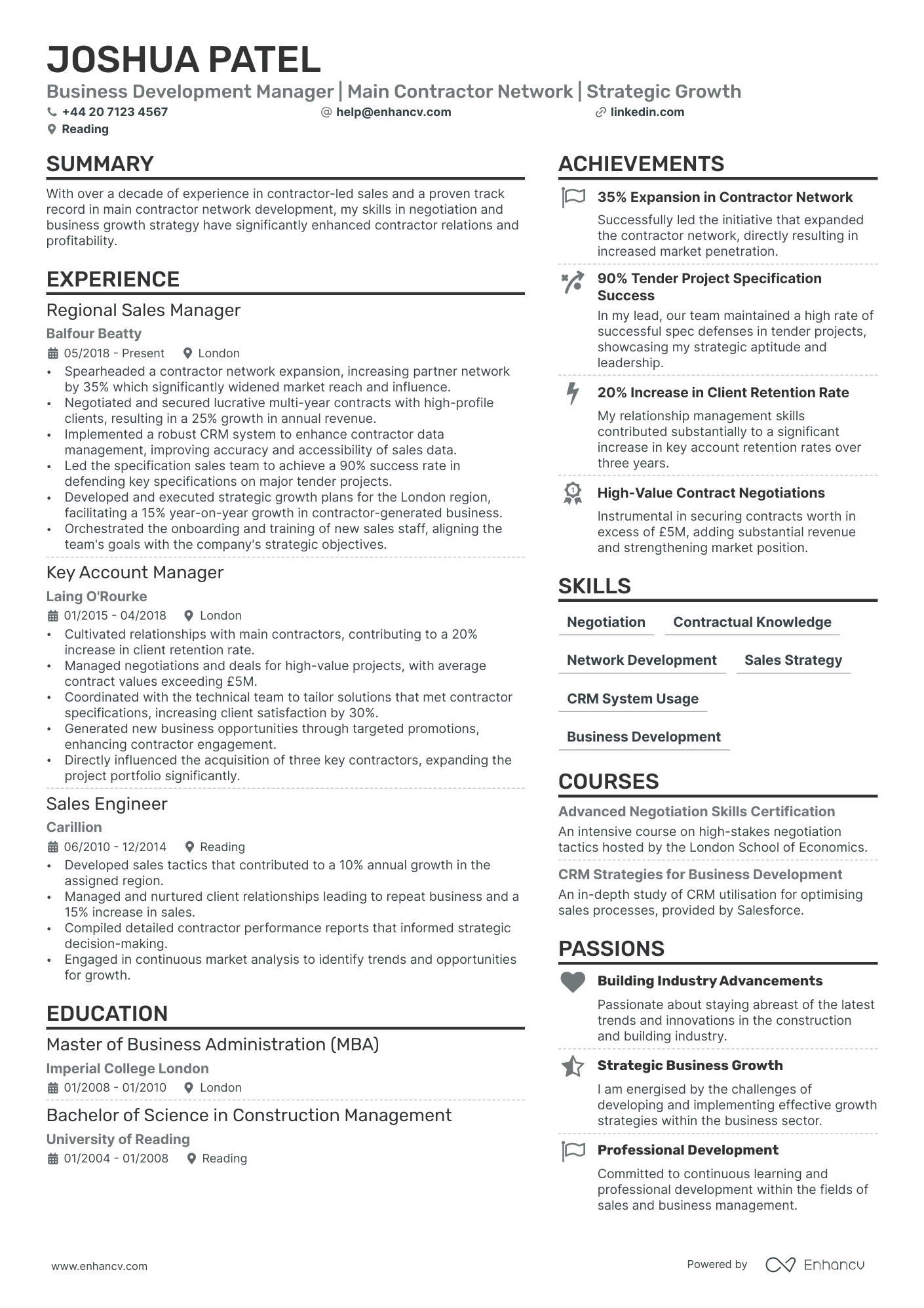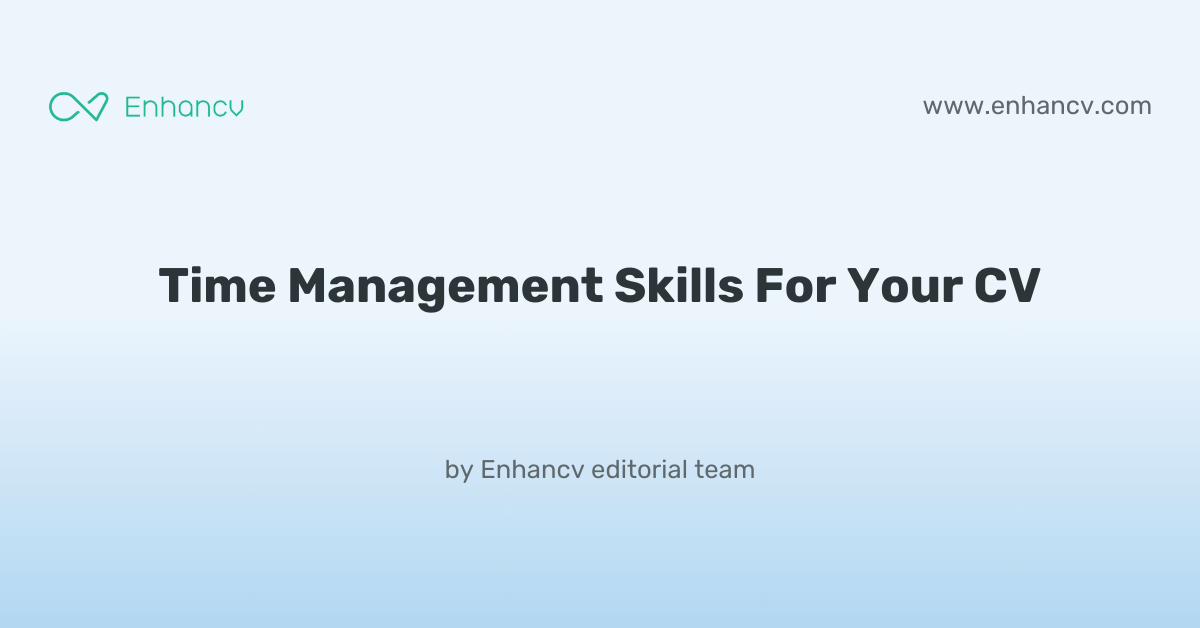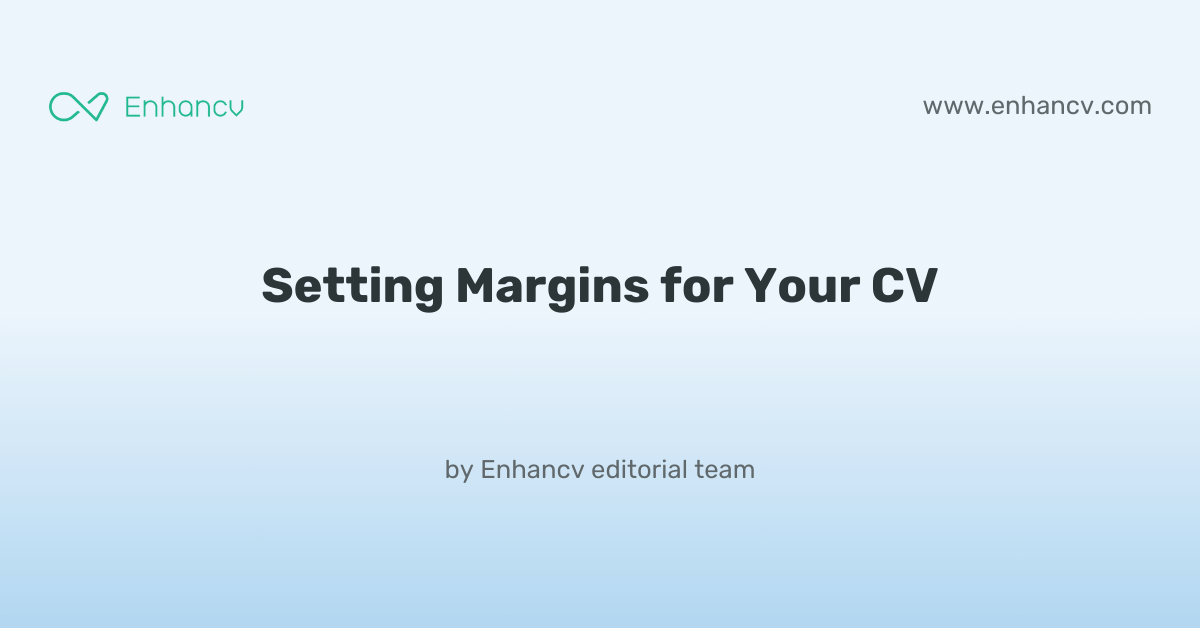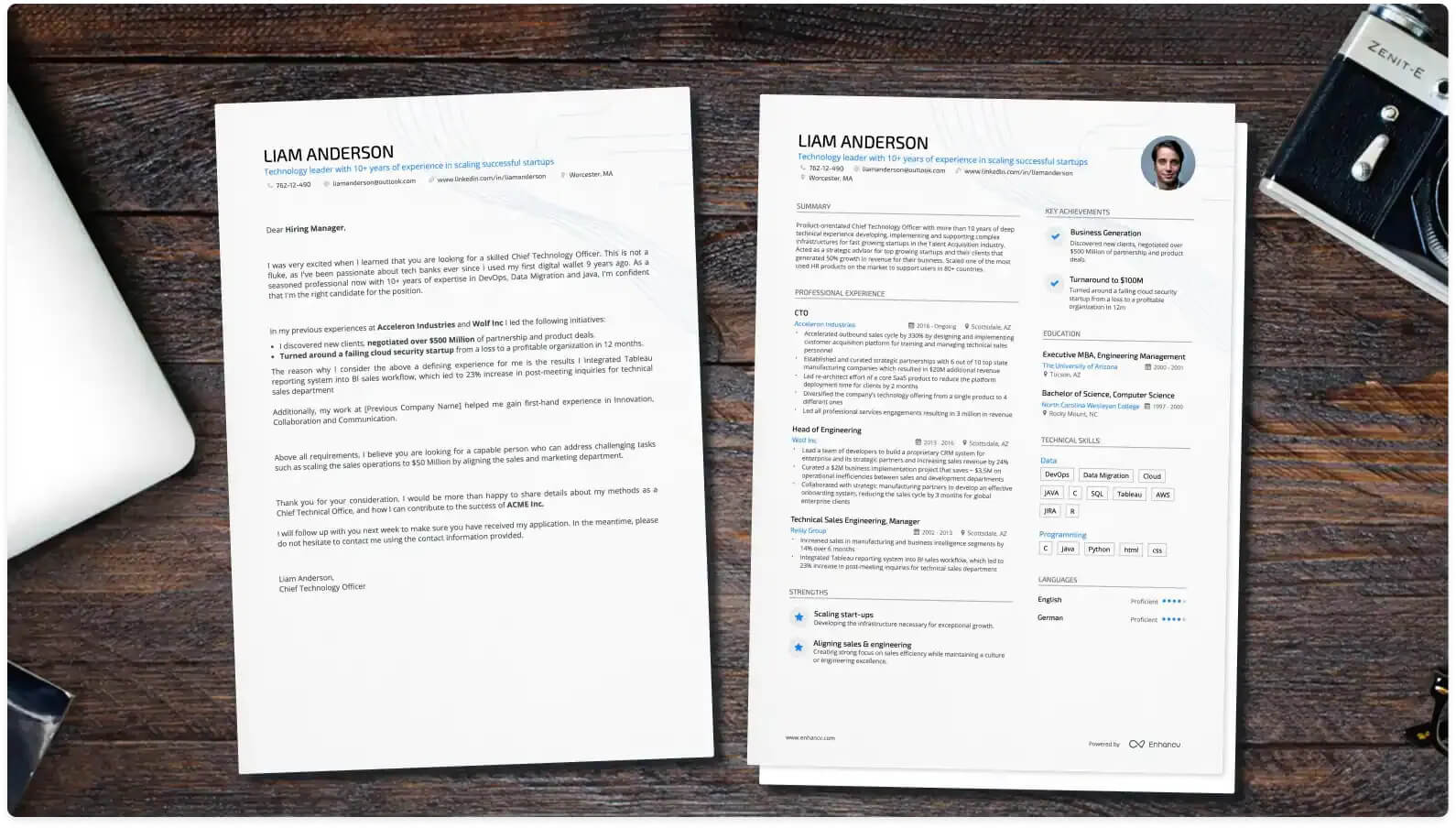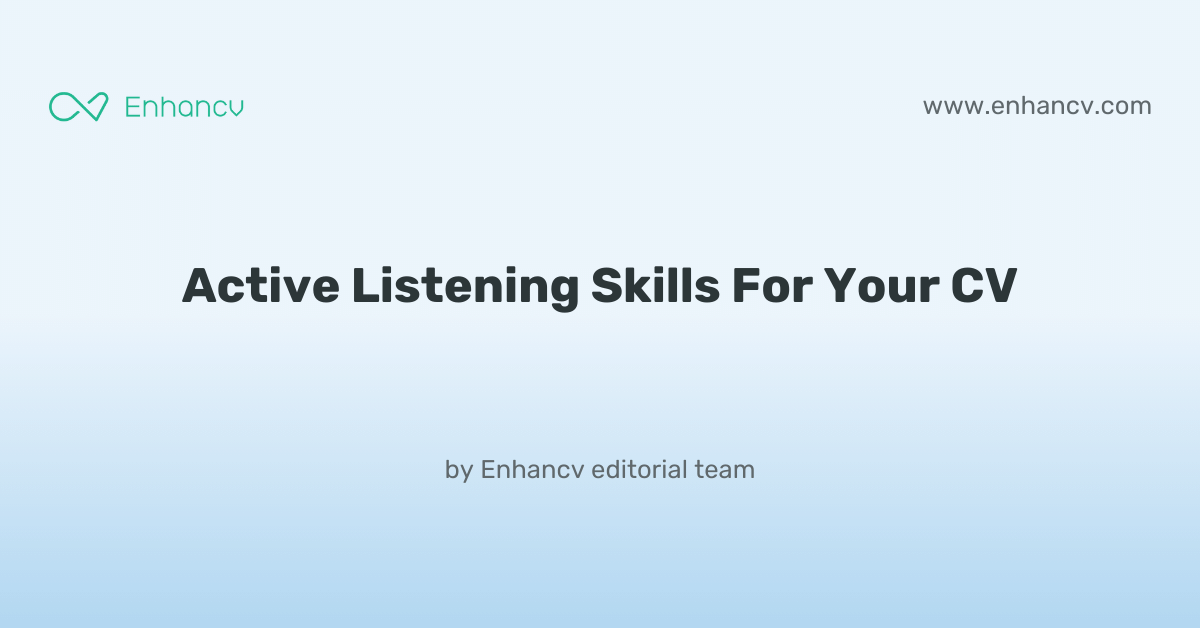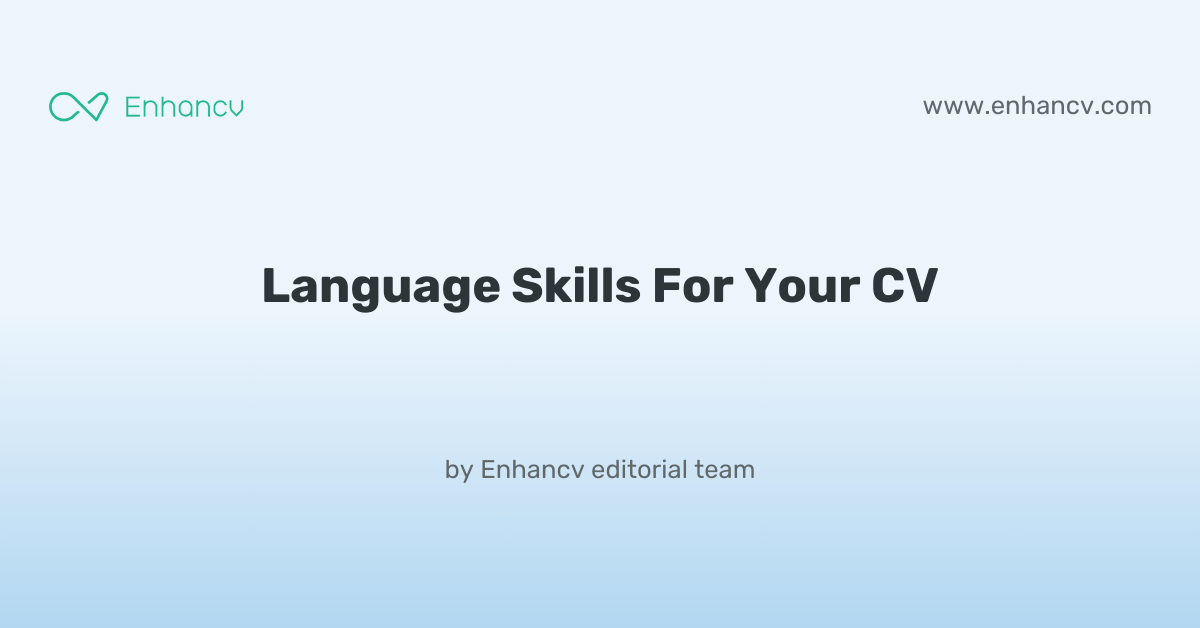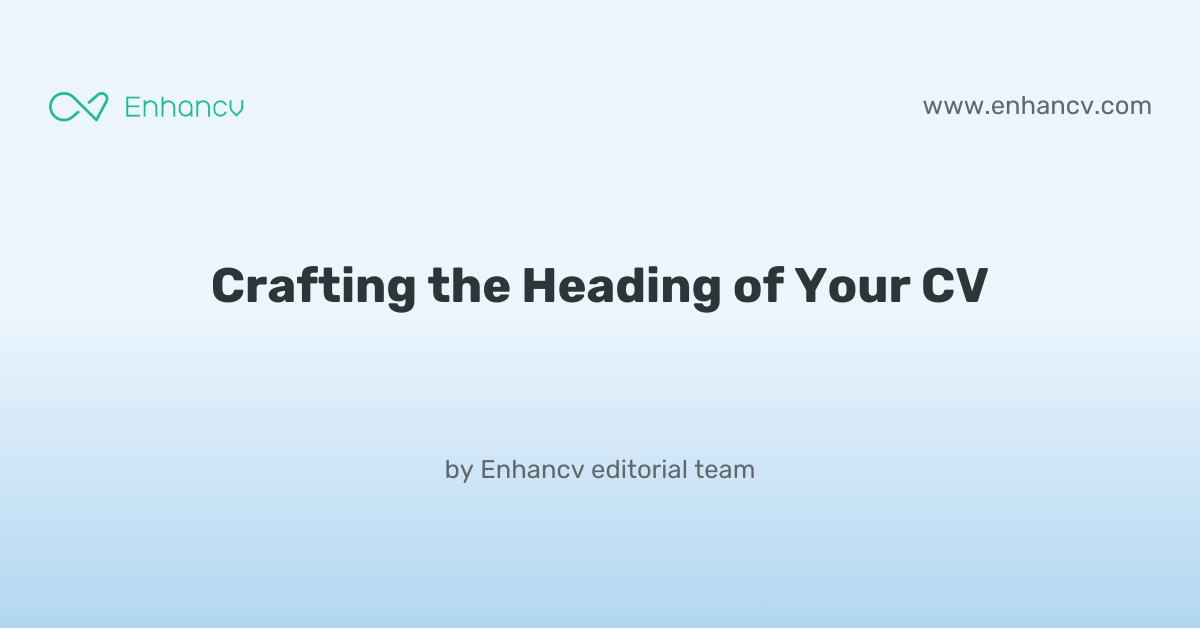Navigating the competitive job market is a significant CV challenge you might encounter as a contractor, often having to tailor your experience to diverse client requirements. Our guide offers detailed strategies and an array of industry-specific tips that can help you stand out, ensuring your CV resonates powerfully with potential employers.
- Applying best practices from real-world examples to ensure your profile always meets recruiters' expectations;
- What to include in your work experience section, apart from your past roles and responsibilities?
- Why are both hard and soft skills important for your application?
- How do you need to format your CV to pass the Applicant Tracker Software (ATS) assessment?
If you're writing your CV for a niche contractor role, make sure to get some inspiration from professionals:
Formatting your contractor CV to meet the role expectations
Staring at the blank page for hours on end, you still have no idea how you should start your professional contractor CV. Should you include more colours, two columns, and which sections? What you should remember about your CV format is this - ensure it's minimalistic and doesn't go over the top with fancy fonts and many colours. Instead, focus on writing consistent content that actually answers the job requirements. But, how about the design itself :- Use the reverse chronological order to showcase your experience, starting with your most recent role;
- Include your contact details (email address, phone number, and location) - and potentially your professional photo - in the header;
- Must-have CV sections include summary or objective, experience, education, and skills: curate the ones that fit your profile;
- Your professional contractor CV should be between one-to-two pages long: select the longer format if you have more experience.
A little bit more about your actual CV design, ensure you're using:
- plenty of serif or sans serif font (e.g. Montserrat, Exo 2, Volkhov) as they are Applicant Tracker System (ATS) compliant. Avoid the likes of Arial and Times New Roman because most candidates' CVs are in this typography.
When submitting your CV, are you still not sure what format it should be? Despite the myth that has been circling around, most modern ATS systems are perfectly capable of reading PDFs. This format is an excellent choice as it keeps all of your information intact.
PRO TIP
Use bold or italics sparingly to draw attention to key points, such as job titles, company names, or significant achievements. Overusing these formatting options can dilute their impact.
The top sections on a contractor CV
- Highlight key contractor projects to showcase experience, because it provides a direct insight into your hands-on expertise and success in relevant projects.
- Outline industry-specific skills such as proficiency in construction software or specialised techniques, this helps identify your unique qualifications.
- Include professional certifications and licenses to establish credibility and meet essential job requirements, as many contractor roles require specific certifications.
- Reference your education and qualifications, as they form the foundation of technical knowledge essential for a contractor.
- Detail safety training and records to emphasise commitment to industry standards and regulations, crucial for on-site roles.
What recruiters value on your CV:
- Highlight your flexibility and adaptability by showcasing a variety of successful projects across multiple industries, emphasising how quickly you acclimatised to new environments and requirements.
- Focus on specific outcomes and achievements rather than just listing responsibilities, using metrics where possible to quantify your contributions to each contract role.
- Demonstrate your specialist skills and expertise by mentioning any niche technologies, methodologies, or industry areas in which you have significant experience, showing that you bring value and depth of knowledge to the table.
- Include testimonials or endorsements from previous clients or agencies to add credibility and provide social proof of your professional reputation and work ethic.
- Tailor your CV for each application, clearly aligning your proven track record with the specific needs of the contract role to show you are an ideal fit for the project.
Recommended reads:
Making a good first impression with your contractor CV header
Your typical CV header consists of Your typical CV header consists of contact details and a headline. Make sure to list your professional phone number, email address, and a link to your professional portfolio (or, alternatively, your LinkedIn profile). When writing your CV headline , ensure it's:
- tailored to the job you're applying for;
- highlights your unique value as a professional;
- concise, yet matches relevant job ad keywords.
You can, for examples, list your current job title or a particular skill as part of your headline. Now, if you decide on including your photo in your CV header, ensure it's a professional one, rather than one from your graduation or night out. You may happen to have plenty more questions on how to make best the use of your CV headline. We'll help you with some real-world examples, below.
Examples of good CV headlines for contractor:
- "Electrical Project Manager | NEBOSH Certified | 10+ Years in Commercial Installations | Energy Efficiency Specialist"
- "Senior Construction Supervisor | Chartered Builder | Health & Safety Compliance | 15 Years Site Management Experience"
- "HVAC Engineer | City & Guilds Level 3 | Renewable Energy Systems | Expertise in Climate Control | 8 Years"
- "Site Engineer | Degree in Civil Engineering | Structural Analysis | Proficient in CAD | 5 Years On-Site Coordination"
- "Plumbing & Heating Technician | Gas Safe Registered | Residential & Commercial Projects | 12 Years Trade Experience"
- "Lead Architectural Designer | RIBA Chartered | Sustainable Design Innovator | 20+ Years in Residential Development"
Opting between a contractor CV summary or objective
Within the top one third of your contractor CV, you have the opportunity to briefly summarise your best achievements or present your professional goals and dreams. Those two functions are met by either the CV summary or the objective.
- The summary is three-to-five sentences long and should narrate your best successes, while answering key requirements for the role. Select up to three skills which you can feature in your summary. Always aim to present what the actual outcomes were of using your particular skill set. The summary is an excellent choice for more experienced professionals.
- The objective is more focused on showcasing your unique value as a candidate and defining your dreams and ambitions. Think about highlighting how this current opportunity would answer your career vision. Also, about how you could help your potential employers grow. The objective matches the needs of less experienced candidates, who need to prove their skill set and, in particular, their soft skills.
Still not sure about how to write your CV opening statement? Use some best industry examples as inspiration:
CV summaries for a contractor job:
- Seasoned electrical contractor with over a decade of experience in complex residential and commercial wiring solutions, including the recent completion of a high-profile eco-friendly smart building project. Familiarity with the latest energy-efficient technologies ensures the delivery of modern and compliant installations.
- Dedicated civil contractor boasting 15 years of hands-on experience in infrastructural developments, skilled in advanced project management techniques, and a proven track record of delivering multi-million-pound projects under budget and ahead of schedule.
- Former software developer keen to transition into the construction industry, brings 8 years of meticulous problem-solving and project coordination skills. Successful past collaboration in cross-functional teams to launch award-winning applications can translate into efficient handling of construction projects.
- Dynamic marketing professional eager to apply a decade of strategic planning and brand growth success towards a new career in construction management. Proven ability in leading teams to generate business leads and manage large-scale campaigns aligns seamlessly with the complexities and challenges of construction project oversight.
- Eager to embark on a career as a contractor, bringing a strong academic background in civil engineering and a passion for sustainable building practices. Objective to leverage internship experience in site analysis and design to grow with a forward-thinking construction firm.
- Recent trade school graduate aiming to begin a career in electrical contracting, equipped with a solid foundation in electrical theory, a keen interest in modern lighting design, and hands-on training in wiring and safety protocols. Seeking to apply learnings and adapt quickly in a fast-paced contracting environment.
Narrating the details of your contractor CV experience section
Perhaps you've heard it time and time again, but, how you present your experience is what matters the most. Your CV experience section - that details your work history alongside your accomplishments - is the space to spotlight your unqiue expertise and talents. So, avoid solely listing your responsibilities, but instead:
- adverts' keywords and integrate those in your experience section;
- Use your CV to detail how you've been promoted in the past by including experience in the reverse chronological order.
Before you start writing your contractor CV experience section, dive into some industry-leading examples on how to structure your bullets.
Best practices for your CV's work experience section
- Clearly state the duration of each contract, including the month and year it started and ended, as these details are crucial for employers to understand the extent of your experience.
- Outline specific projects you worked on including your role, the project goals, and the value you brought to the team, ensuring these are relevant to the job you're applying for.
- Highlight technical skills and tools you are proficient in, especially those that are in demand or unique to your field, as this can set you apart from other candidates.
- Mention any notable successes or achievements, such as completing projects ahead of schedule or under budget, as these can demonstrate your effectiveness as a contractor.
- Describe the scope of your responsibilities in each role to give the potential employer a sense of your capabilities and day-to-day tasks.
- Include any instances where you've had to demonstrate leadership or manage a team, as these experiences are valuable regardless of the industry or project.
- Outline how you've adapted to different working environments and company cultures, as this shows flexibility and the ability to integrate quickly into new teams.
- Detail any client-facing experience and your ability to manage relationships, as good communication skills are critical for contractors who often negotiate their own terms and represent their own services.
- If you’ve worked in diverse industries or on a variety of projects, emphasise this versatility and how it has broadened your professional skill set.
- Spearheaded the development of a new residential complex with a project budget of £5 million, ensuring successful completion 2 months ahead of schedule
- Managed a cross-functional team of 50, including subcontractors, architects, and site workers, enhancing team productivity by 30%
- Implemented innovative construction methods and sustainability practices, reducing materials waste by 15% and energy consumption by 20%
- Oversaw a major office refurbishment project for a Fortune 500 company with a budget of £10 million, delivering the project on budget and improving client satisfaction by 40%
- Negotiated and secured contracts with new suppliers, achieving a cost reduction of 10% on building materials while maintaining quality standards
- Drove the adoption of project management software among the project team, increasing operational efficiency by 25% and reducing miscommunication errors
- Successfully completed 20+ residential remodelling projects with an average project value of £80,000, resulting in an average client satisfaction rate increase of 35%
- Created tailored work plans for renovation projects, improving project delivery times by 15% through effective scheduling and resource management
- Enhanced on-site safety protocols, contributing to a 20% reduction in workplace accidents and commended for achieving an exemplary safety record
- Led a high-profile historic building restoration project with a budget of £3 million, preserving architectural integrity while incorporating modern amenities
- Negotiated contracts with vendors to procure high-quality materials at competitive prices, saving the project around 5% in projected costs
- Mentored a team of junior contractors and contributed to their skill development, resulting in a 20% increase in workforce efficiency
- Completed the construction of a shopping centre 1 month ahead of the 18-month deadline and under budget by 8%, enhancing company reputation with clients
- Implemented a site-specific risk management plan that lowered insurance premiums by 12% due to improved safety standards
- Fostered strong relationships with key stakeholders, leading to the successful acquisition of three new lucrative contracts for future projects
- Managed the construction of a large-scale bypass road project valued at £20 million, which improved local traffic flow by 25%
- Successfully negotiated and managed a portfolio of contracts that reduced operational costs by 11% without compromising on project deadlines or quality
- Liaised with local government bodies to ensure all construction activities complied with legal and environmental standards
- Coordinated the electrical installation for a new high-rise apartment complex, ensuring all work met strict quality and safety standards
- Implemented cost-saving strategies in electrical materials procurement, saving the project an estimated £150,000 in unnecessary expenditures
- Developed and delivered an on-site training program for newer electricians which increased team skill levels and productivity by 18%
- Spearheaded the mechanical systems overhaul for a landmark hotel, incorporating energy-efficient technologies that cut the client's energy bills by 22%
- Delivered all mechanical contracting work within the set timeline of 24 months, despite initial delays due to unforeseen structural challenges
- Formulated a predictive maintenance schedule for the mechanical systems installed, drastically reducing downtime and maintenance costs by 30% for the client
What to add in your contractor CV experience section with no professional experience
If you don't have the standard nine-to-five professional experience, yet are still keen on applying for the job, here's what you can do:
- List any internships, part-time roles, volunteer experience, or basically any work you've done that meets the job requirements and is in the same industry;
- Showcase any project you've done in your free time (even if you completed them with family and friends) that will hint at your experience and skill set;
- Replace the standard, CV experience section with a strengths or achievements one. This will help you spotlight your transferrable skills that apply to the role.
Recommended reads:
PRO TIP
If applicable, briefly mention a situation where things didn’t go as planned and what you learned from it, demonstrating your ability to learn and adapt.
Mix and match hard and soft skills across your contractor CV
Your skill set play an equally valid role as your experience to your application. That is because recruiters are looking for both:
- hard skills or your aptitude in applying particular technologies
- soft skills or your ability to work in a team using your personal skills, e.g. leadership, time management, etc.
Are you wondering how you should include both hard and soft skills across your contractor CV? Use the:
- skills section to list between ten and twelve technologies that are part of the job requirement (and that you're capable to use);
- strengths and achievements section to detail how you've used particular hard and soft skills that led to great results for you at work;
- summary or objective to spotlight up to three skills that are crucial for the role and how they've helped you optimise your work processes.
One final note - when writing about the skills you have, make sure to match them exactly as they are written in the job ad. Take this precautionary measure to ensure your CV passes the Applicant Tracker System (ATS) assessment.
Top skills for your contractor CV:
Project Management
Budgeting and Financial Management
Contract Negotiation
Risk Management
Quality Control
Technical Knowledge
Health and Safety Regulation Compliance
Scheduling and Planning
Building and Construction Skills
Regulatory Knowledge
Communication
Leadership
Problem-Solving
Teamwork
Attention to Detail
Decision Making
Time Management
Adaptability
Client Relations
Conflict Resolution
PRO TIP
Order your skills based on the relevance to the role you're applying for, ensuring the most pertinent skills catch the employer's attention first.
Further professional qualifications for your contractor CV: education and certificates
As you're nearing the end of your contractor CV, you may wonder what else will be relevant to the role. Recruiters are keen on understanding your academic background, as it teaches you an array of hard and soft skills. Create a dedicated education section that lists your:
- applicable higher education diplomas or ones that are at a postgraduate level;
- diploma, followed up with your higher education institution and start-graduation dates;
- extracurricular activities and honours, only if you deem that recruiters will find them impressive.
Follow a similar logic when presenting your certificates. Always select ones that will support your niche expertise and hint at what it's like to work with you. Balance both technical certification with soft skills courses to answer job requirements and company values. Wondering what the most sought out certificates are for the industry? Look no further:
PRO TIP
Use mini case studies or success stories in your CV to demonstrate how your skills have positively impacted previous roles or projects.
Recommended reads:
Key takeaways
Your successful job application depends on how you well you have aligned your contractor CV to the job description and portrayed your best skills and traits. Make sure to:
- Select your CV format, so that it ensures your experience is easy to read and understand;
- Include your professional contact details and a link to your portfolio, so that recruiters can easily get in touch with you and preview your work;
- Write a CV summary if you happen to have more relevant professional experience. Meanwhile, use the objective to showcase your career dreams and ambitions;
- In your CV experience section bullets, back up your individual skills and responsibilities with tangible achievements;
- Have a healthy balance between hard and soft skills to answer the job requirements and hint at your unique professional value.
